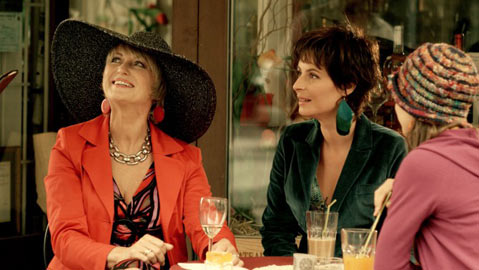Eastern Bloc
Eastern European Sidebar Lets Some Lite In

In its mere fourth year as cinematic sidebar, Eastern Bloc has not only provided many of SBIFF’s most exotic film specimens (I offer last year’s Zift, the Bulgarian film noir, and Serbia’s sex and explosion fable Tears for Sale as all the evidence I’ll need), but in less than a half decade, the fest’s Balkan Bijou has evolved joyously under our rapt gaze, too.
“In the past these films have been really dark and political for obvious reasons,” explained Candace Schermerhorn, the film fest’s director of programming. “They reflected realities like the war in Bosnia, the loss of an entire male population. But something happened recently, the storytelling isn’t so weighed down. It’s — I don’t know what’s the exact word — it’s been leavened,” she adds raising her arms in mimed triumph.
Onscreen sex is part of the reason, though Schermerhorn prefers to think about a new freedom about relationships. “And also, individuality. That’s new,” she said, mindful of the paradox. In collective communities, the individual is something like revolution.
The films back her claims. Take Tilt, for instance, a Bulgarian movie in which director Viktor Chulkhov explores the periods surrounding before and after the fall of that country’s Communist regime, with young people — always the vanguard of change — living literal underground lives sampling punk rock, porn, and skateboarding. It all ends in a too, too western brave new world of gangster capitalism, but at the story’s core is forbidden romance: Romeo and Juliet with running dog pinball machines.
Two better films shrug off memories of repression completely, exulting in the joys of festive and furtive sex and family — sometimes bringing those two strands closer than you might find comfortable. Czech director Jiri Vejedelek’s Women in Temptation (a big hit over there) showcases three generations of beautiful Serbian women — wild grandma, staid mom, and hippieish daughter — in a sex roundelay that keeps you guessing till the end whose boyfriend will end up with which inappropriate partner. Funny, sexy and ultimately touched with impermanence, as W.B. Yeats once said, a world where everything changes and fades away.
My favorite film, however, is Just Between Us, starring Miki Manoljovic, a rumpled and randy alternate universe Walter Matthau in a brilliantly-scripted Rajko Grlic tale of two brothers more than living up to the legacy of their artist father — the line between joyous sexuality and heartbreaking unfaithfulness keeps blurring and revelations keep, um, coming. What communists?
Other films cozy up to the life of the past in ways that try to reconcile its burdens. New found freedom versus the gray Marxist tough love of humanity. Technological circumstances prevented me from seeing the acclaimed Polish film Dance Marathon, which presents a cross-sampling of citizenry dancing for money — they shoot Solidarity horses, don’t they? I also missed the fest-staff-revered Belvedere by director Ahmed Imamovic that tells of the aftermath of ethnic cleansing in Bosnia.
But I did catch The Light Thief, however, a slow-paced, yet hypnotically strange story from Kyrgyz, a land where the old west, the Tartar steppes, gangster thuggery, and a fading poetic sense of village life versus private property come to a silently tragic loggerheads. Sometimes the personal can be political in ways that explodes our naïve sense of individuality.
Two films bound to make people chat up the Metro Theatre chalkboard area also work the fine lie between the soulless state and the state of our souls. I found Adis Bakrach’s film The Outsiders plodding, and mushy in its structure. On the other hand, there are moments you won’t forget in this story of a Sarajevo orphanage. The movie mixes Great Expectations with Truffaut’s Small Change, as the main protagonist, searching for his mother moves from petty crime to casual murder. After the brutalities of war, there are echoes and shocking odd twists of fate.
Fest-meister Roger Durling puts that a little differently. “One thing you have to understand about Eastern Europe with all its troubles is its strong tradition of theater of the absurd, the existential.” Durling offered this caveat of surrealities discussing the elegantly-titled If I Want to Whistle, I Whistle, surely the most striking of all the Eastern Bloc offerings. From Romania, though compared to the work of the Belgium Dardennes Brothers, Florin Serban’s brilliantly-detailed film follows Silviu (George Pistareanu), a brutish, dour, but moody brooder in minimum security prison quite near his release. (It’s allegory time!) As Silviu’s discontent slowly rises to violence, it’s met with an absurd romantic flourish, and we become captive of the random forces that push the narrative and control the lives we’re watching.
Even the in slow films, the Eastern Bloc proves itself too far from Hollywood to serve up formulas, whether leavened or not, the films are all capable of startling imagery and surprising craft.



